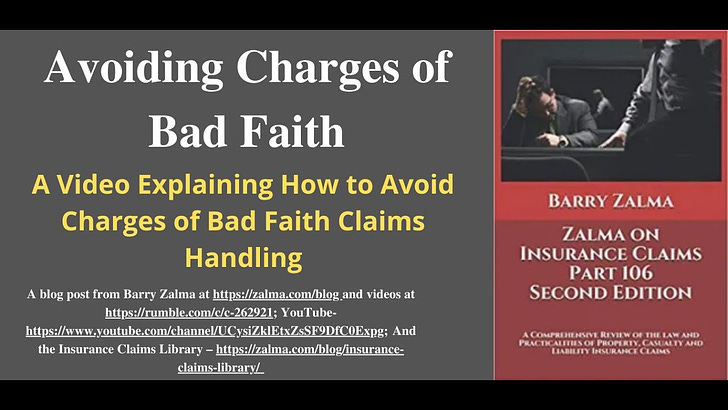A Video Explaining How to Avoid Charges of Bad Faith Claims Handling
The Adjuster & Good Faith Claims Handling
Read the full article at https://www.linkedin.com/pulse/adjuster-good-faith-claims-handling-barry-zalma-esq-cfe and see the full video at
and at https://rumble.com/zalma and at https://zalma.com/blog plus more than 3850 posts.
Posted on September 3, 2021 by Barry Zalma
See the full video at
and at https://rumble.com/zalma
The basic test in bad faith cases is whether the insurer has unreasonably and “without proper cause” refused to compensate the insured for a loss covered by the policy. [Gruenberg v. Aetna Insurance Co., 9 Cal. 3d 566, 108 Cal. Rptr. 480].
The adjuster should not attempt to adjust a claim, or even contact an insured, until he or she knows everything necessary to protect the rights of the insurer without doing anything to injure the right of the insured to receive the benefits of the policy. This means the adjuster must have thoroughly reviewed the wording of the insurance policy, the application for insurance, and the loss notice. The adjuster must then, begin to investigate all claims fully and thoroughly.
Charges of “bad faith” can be eliminated by adjusting all claims in a detailed and fundamentally sound manner.
People insure themselves for peace of mind and security. To protect these interests it is essential that an insurer fully inquire into the possible bases that might support the insured’s claim and act promptly. [Kanne v. Connecticut General, 607 F. Supp. 899 (C.D. Cal., 1985).]
The insurer may not gather just enough evidence to support a belief that the policy does not provide coverage and then quit the search.
The statutory cause of action for extra-contractual damages simply never comes into existence until expiration of the sixty-day window without the payment of the damages owed under the contract. We find that in creating this statutory remedy for bad-faith actions, the Legislature provided this sixty-day window as a last opportunity for insurers to comply with their claim-handling obligations when a good-faith decision by the insurer would indicate that contractual benefits are owed. Talat Enterprises, Inc. v. Aetna Cas. & Sur. Co., 2000 WL 232303, 753 So.2d 1278 (Fla., 2000).
© 2021 – Barry Zalma
Barry Zalma, Esq., CFE, now limits his practice to service as an insurance consultant specializing in insurance coverage, insurance claims handling, insurance bad faith and insurance fraud almost equally for insurers and policyholders.
He also serves as an arbitrator or mediator for insurance related disputes. He practiced law in California for more than 44 years as an insurance coverage and claims handling lawyer and more than 54 years in the insurance business.
He is available at
http://www.zalma.com and zalma@zalma.com. Mr. Zalma is the first recipient of the first annual Claims Magazine/ACE Legend Award. Over the last 53 years Barry Zalma has dedicated his life to insurance, insurance claims and the need to defeat insurance fraud. He has created the following library of books and other materials to make it possible for insurers and their claims staff to become insurance claims professionals.
Go to the podcast Zalma On Insurance at https://anchor.fm/barry-zalma; Follow Mr. Zalma on Twitter at https://twitter.com/bzalma; Go to Barry Zalma videos at Rumble.com at https://rumble.com/c/c-262921; Go to Barry Zalma on YouTube- https://www.youtube.com/channel/UCysiZklEtxZsSF9DfC0Expg; Go to the Insurance Claims Library – https://zalma.com/blog/insurance-claims-library/ The last two issues of ZIFL are available at https://zalma.com/zalmas-insurance-fraud-letter-2/ podcast now available at https://podcasts.apple.com/us/podcast/zalma-on-insurance/id1509583809?uo=4





